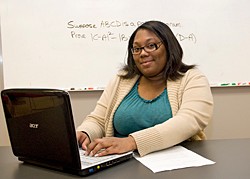
Graduate Looks Ahead to Nurturing STEMM Talents in Urban Schools
As Lekeisha Sherman looks ahead to achieving her bachelors degree in secondary math education in June, shes finishing up her UC course load and she gained her required experience working as a teacher intern this spring at Clark Montessori School, where she taught 11th grade algebra and ninth grade geometry.
Sherman is one of 12 students taking part in a unique pilot program in the College of Education, Criminal Justice, and Human Services (CECH), first launched in 2004 with a $500,000 donation from Toyota Motor Engineering & Manufacturing, North America, Inc. (TEMA). This pilot program, the African American Initiative for Math and Science (AAIMS), provided full tuition for students recruited into the program to prepare teachers talented in math and science to teach in an urban school environment. As part of her obligation to the program, Sherman will commit to teach at least five years in an urban school following her graduation from UC.
National figures indicate 50 percent of all new teachers in urban schools leave the job within five years schools in which the majority of the students are African-American. Students in the AAIMS program are familiar with the culture of the urban school systems. They came from that culture and because theyre comfortable in that culture, theyre more likely to stay, says Calvert Smith, PhD, director of the AAIMS program. Furthermore, they have strong backgrounds in math and science, so theyll be bringing those strengths into the urban community to benefit future students, says Smith, who developed the program based on decades of his research. AAIMS also reflects the state of Ohios emphasis on building skills in the Science, Technology, Engineering, Math and Medicine (STEMM) fields.
Sherman is a product of the urban schools. In fact, before she became a student at this urban research university, she was attending high school just down the street. The 22-year-old graduated from the Teaching and Technology Program at Hughes Center. Four of us from the Hughes program were accepted (into the AAIMS program). Sherman says, We went through an interview process, and after high school graduation, we entered the Emerging Ethnic Engineering (E3) summer bridge program. I was awarded English credit and stayed in Turner Hall.

Sherman
I always wanted to teach, she says. I remember that I used to always try and teach my little sisters. She also remembers a mentor and math teacher at Hughes as she rounds this last journey to her college graduation. Mr. (Wayne) Harner was a math teacher and he was always very caring and made students feel welcome in his class, she says.
Lekeisha is an outstanding student, says Smith. Shes working and shes keeping up her studies and doing well. She has done a very good job.
Its a good job that has also brought pride to her family. Oh yes, my mom tells everyone I go to college, she says. On June 14, her mom can tell everyone that Lekeisha graduated from college.
Funding Sources for AAIMS Program
- Toyota Motor Engineering & Manufacturing, North America, Inc. (TEMA) $500,000
- Daniel & Susan Pfau Foundation $50,000
- Cincinnatus Association $32,000
- The Thomas J. Emery Memorial $25,000
- Robert H. Reakirt Foundation $17,000
- UC College of Education, Criminal Justice, and Human Services $104,250
- Financial Aid and other scholarships $58,659
Total $786,909
Related Stories
Donors drive record-breaking support for UC and UC Health
July 22, 2025
Generous donors have propelled the University of Cincinnati and UC Health to a historic fundraising year, contributing an unprecedented $228,479,079 in support.
Human Services professor honored for groundbreaking...
July 17, 2025
On June 27, 2025, Ohio University’s College of Business honored Kelley for his contributions to the field of sport administration, presenting him with a Certificate of Recognition at the MAA Forum at the Muck Business Annex in Athens.
AI advancements give hackers new ways to launch cyberattacks
June 30, 2025
Advancements in technology such as artificial intelligence give cyber criminals more ways to exploit data. The Dayton Daily News looked to University of Cincinnati’s Richard Harknett, PhD, for context on the recent influx of cyberattacks. Harknett is co-director of the Ohio Cyber Range Institute, chair of the Center for Cyber Strategy and Policy and director of UC’s School of Public and International Affairs.
